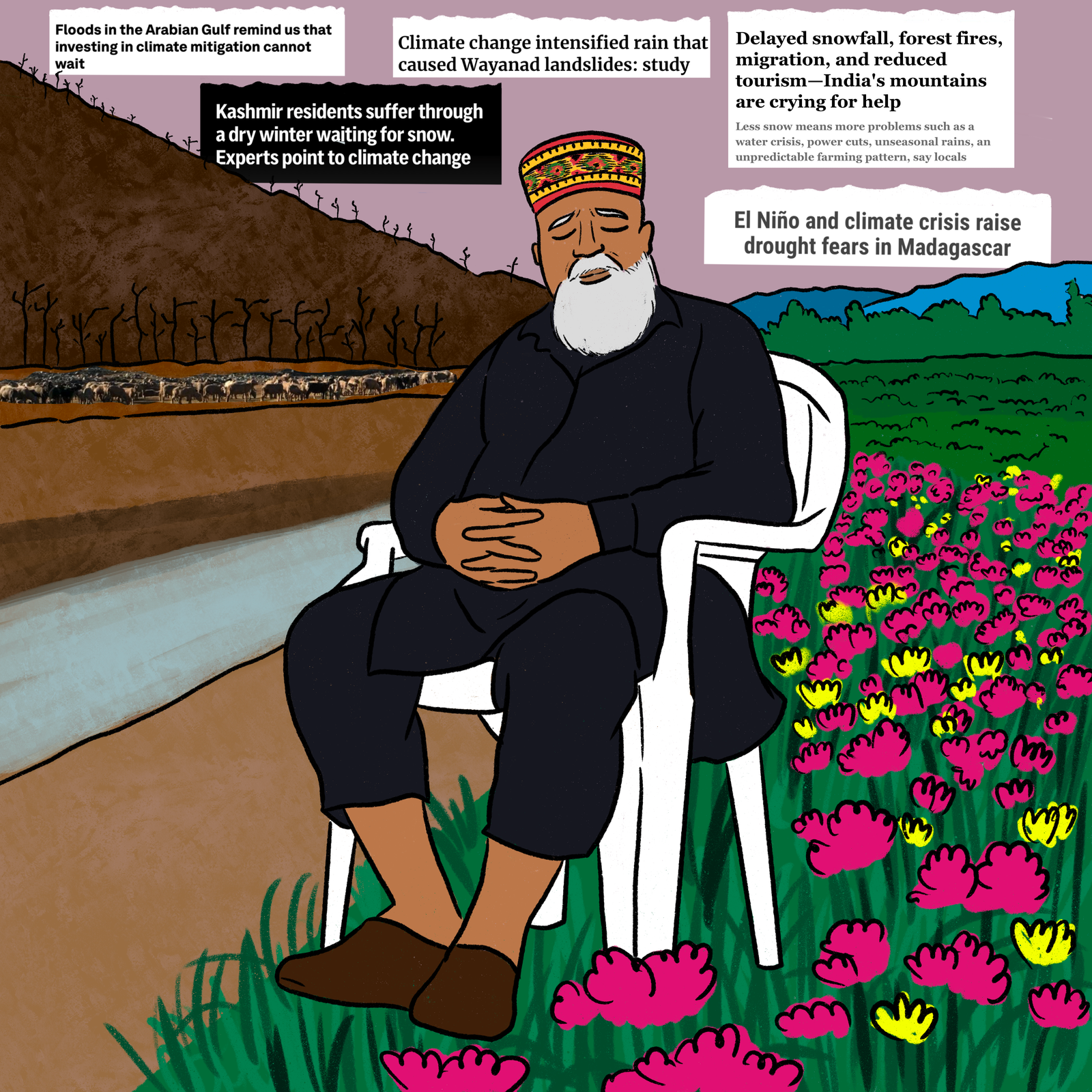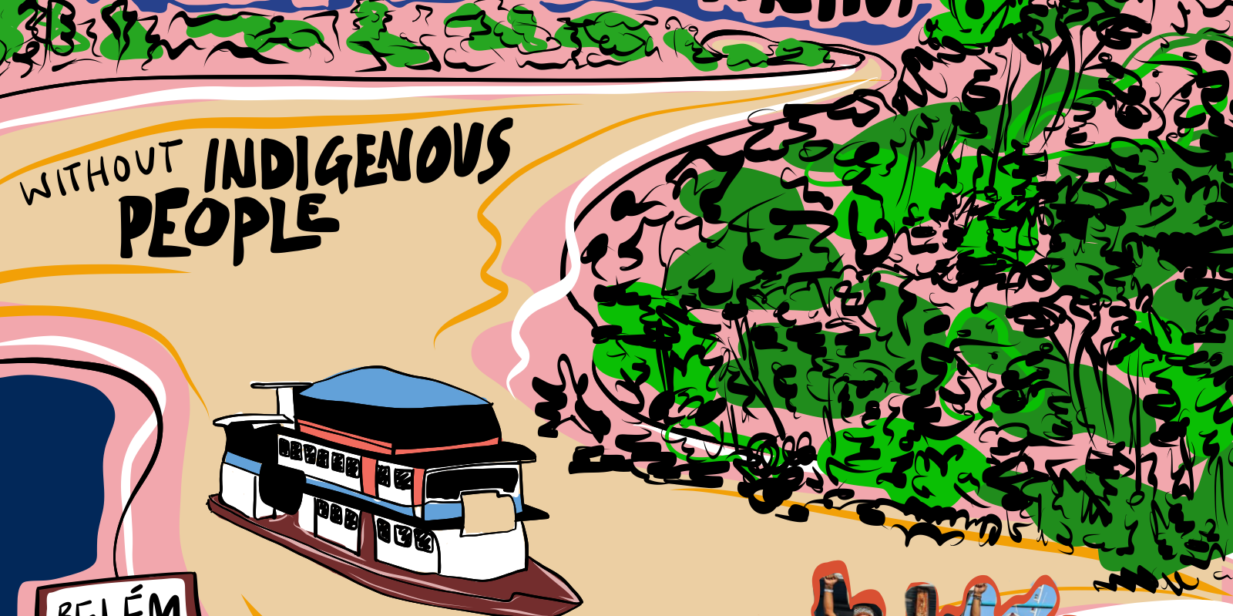I’ll always remember one of our last family picnics to Gunthal, our family village, which is cradled in the Pir Panjal Mountain range of the lower Himalayas of Jammu and Kashmir. As we meandered through the paths, my grandfather – a stickler for punctuality – chided us for our leisurely pace. He predicted rain at 2pm despite the noon’s clear sky.
Doubtful, I challenged his forecast, only to watch the sky darken precisely as he foretold. It was a moment that etched in me a deep respect for the oral wisdom and traditional knowledge passed down through generations. When the rains arrived, as he foretold, at precisely 2pm, it was not merely a meteorological occurrence, but a reaffirmation of his deep-seated harmony with nature.
My grandfather had a visceral connection with the Earth. Our ancestral spring, or ‘Badh’, as he called it in Pahari, was a vein of life for the village, and was as much a part of our family’s heritage as the tales that defined our lineage. As I watched the spring dwindle over the years, my grandfather’s unspoken sorrow became my own.
A legacy of stewardship
Today, I’m based in Europe and work in media, but my climate justice advocacy is coloured by the hues of my grandfather’s wisdom, his hands steeped in the soil of his beloved land. In his twilight years, he implored me to revive our family’s bond with this land and resurrect the spring that once flourished. A promise made, not just to a man of the soil, but to the ethos of a generation.
Carrying the weight of these promises, I found myself amidst a confluence of global leaders at the UN Water Conference in 2023. Here, the stark projection of water scarcity was not an abstract concept, but a reflection of the plight I had witnessed first-hand. The imminent threat of a world where between two and three billion people experience water shortage was a clarion call to protect our most precious resource.
As we navigated the complex discussions on global sustainability, I found within it threads of my own story. The dialogue at the conference resonated with my recollections of the vast agricultural plains of Punjab – a neighbouring state to my home state of Jammu and Kashmir. Those in the Breadbasket of India, once known for the ‘Green Revolution,’ told their own tale of water scarcity, where the increase in farmer suicides is a stark indicator of an escalating crisis.
The ‘Aqueduct’ tool, showcased at the conference by the World Resources Institute, highlighted water stress hotspots with the same precision my grandfather had in predicting the rain. By 2040, up to 33 countries could face severe water shortages, and the solutions lie not only in technological innovation, but also in the kind of Indigenous knowledge that had once told me the skies would open. The journey from my grandfather’s side in the Himalayas, to the international stages of environmental discourse, was not just a passage through geography, but through perspectives.
It drew me back to the diverging paths of my father and grandfather during our family’s last yearly pilgrimage to the Sufi shrine of ‘Khwaja Garib Nawaz’ in Ajmer, Rajasthan. While driving past the vast agricultural lands on the way to Jaipur, the generational divide was laid bare: my father’s admiration for the tangible progress of roads and buildings, symbolising a modernising India, contrasted sharply with my grandfather’s attuned eye surveying the changing agricultural landscape, reflecting a deep concern for the environmental impact and the loss of traditional farming practices.
This contrast highlighted the shifting values and perspectives between generations, a recurring theme of balancing progress with preservation in my own journey.
Catalyst for change
In 1999, my parents moved us to the Srinagar city of Jammu and Kashmir for better schooling. As a child of the city, my understanding of our natural resources was shaped by contrasting visuals: the decaying vibrancy of rural livelihoods against the relentless expansion of urban sprawl. Yet, it was the moral fabric of our society, strained by systemic oppression and injustice, that drew my focus.
Growing up amidst the political conflict and witnessing the marginalisation of my community, I realised that social inequality and environmental degradation were interconnected. This awakening was solidified through the personal stories and grassroots projects I encountered, and the conferences I attended – from the local wisdom at the heart of COP discussions to the global policies debated in the halls of the UN Conferences.
It was within the halls of COP28, amidst dialogues on culture and energy sustainability, that my grandfather’s teachings crystallised into a vision. The narrative I carried was not solely mine but echoed the voices of ancestors who had revered the winds, the rains, and the springs as sacred. It echoed my late grandfather’s truth – that local and Indigenous knowledge is not merely an alternative but an essential framework for environmental solutions.
This dawning realisation was a catalyst, propelling me further into the realms of environmental advocacy, where local wisdom intersects with the broader strokes of policy and justice. My grandfather’s legacy, steeped in the resilience of the India-Pakistan partition survivor turned farmer, became the cornerstone of my journey.
In the confluence of these memories and experiences, my journey stands as a testament to a legacy that transcends the personal and touches the universal. It is a chronicle of a journey from the whispers of ancestral springs to the clarion calls for global sustainability. It is a pledge to uphold the ancient covenant with the earth – to listen, to nurture, and to protect.
The journey forward is both personal and collective. It is a path of stewardship, where the wisdom of our ancestors guides our steps, and the collaborative spirit of global policy ensures that the water and land that nourish us are cherished and sustained for generations to come. In this journey, my narrative is interwoven with the global tapestry of environmental advocacy – a narrative that began with the land, the wisdom of my grandfather, and the promise of rain at 2pm under a clear blue sky.
What can you do?
Watch:
- Water Bandits, which shows Rajendra Singh – known as ‘The Water Man of India’– reviving Rajasthan’s arid lands through traditional means.
Read:
- Nomadic culture on the Himalayan front line, another piece I wrote
- shado’s Land Defenders series
- shado’s Knowledge Page: What is Circularity?
Listen:
- Julie’s Bicycle Creative Climate Leadership Podcast
- Shado-lite – particularly Samara Almonte’s guest episodes, such as The Power of Filmmaking as Indigenous Storytellers



